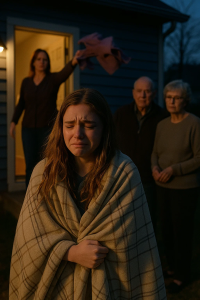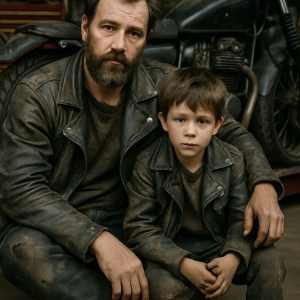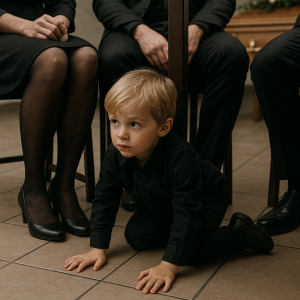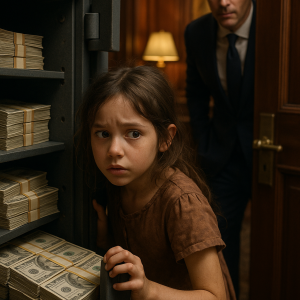My sister kicked my 12-year-old daughter out of my parents’ house while I was away for work.
When I called my mom, she told me we weren’t wanted there. So I stopped paying their bills—and now they’re living with the fallout.
My name is Bella, and I never imagined I’d stand on my parents’ doorstep again. The last real conversation we’d had was three years ago at my grandmother’s funeral. Before that, it was the day they chose my sister Lisa over me when I was eighteen. I can still feel the sting of tears on my cheeks as they announced they were handing my college fund to Lisa—for her wedding.
“But that money was for school,” I cried.
“Your sister deserves a proper wedding,” my mother insisted. “You can take out loans.”
I walked out that day and never really came back. Only my grandmother supported me. She helped me through community college while I worked part-time. Eventually, I earned my degree, built my own life, married, had my daughter Emma, and later divorced. At thirty-six, I was doing fine. I owned an apartment from Grandma’s inheritance, rented it out for steady income, and worked enough hours to have plenty of time with Emma.
Then came the urgent call from my mother that brought me back. I rang the bell.
“Bella, you came!” Mom’s voice was overbright, her face tired. Dad hovered behind her, forcing a strained smile.
“You said it was urgent,” I answered as I stepped inside.
The living room’s once-fancy furniture, bought for Lisa’s wedding, looked worn. Mom burst into sobs—deep, shaking sobs.
“We’re about to lose the house,” Dad finally said.
Of course, it was about Lisa. It always was.
“She begged us to co-sign a loan for Tom’s business,” Mom explained. “We put the house up as collateral.”
“Let me guess,” I said flatly. “They stopped paying.”
“His company went under,” Dad admitted, eyes on the floor. “We can’t keep up.”

A bitter laugh slipped from me. “So now you come to me? The daughter you abandoned? The one you robbed of an education for Lisa’s wedding?”
“We know you’re stable,” Mom rushed. “The rental income… Bella, please. We wouldn’t ask if it wasn’t desperate.”
I stared at them, these people who had always chosen Lisa. “I’ll think about it,” I heard myself say, and the words surprised me as much as them.
Later, Emma asked why I was crying. At nine, she was perceptive.
“I saw your grandparents today,” I told her. She lit up—she’d only seen them in photos. That was when I knew: maybe Emma deserved a chance to know them.
A week later, I drove us back. Emma was thrilled, running to hug them. For a brief moment, I saw real happiness in their faces.
That night, I called Mom. “I’ll help,” I said. “Emma and I will move in. The rent from my apartment will cover the loan. I’ll take on the bills too. But there must be boundaries.”
Two weeks later, we moved in. I bought new appliances. Dad’s back pain eased when he no longer had to handwash dishes. Mom helped Emma with homework. Dad taught her chess. Slowly, a routine formed.
With Emma cared for, I worked more hours and earned a promotion, though it meant occasional travel. Things looked steady—except Lisa never left their orbit. I noticed secret transfers of money to her account.
“She’s struggling,” Mom excused.
“Struggling?” I snapped. “I’m covering your loan—her loan—and all your bills. You’re funneling money to her on top of it?”
Mom would shut down the conversation.
Three years went by like that. Then one Tuesday, I came home early from a trip. From the driveway, I heard shouting. Inside was chaos—Lisa sprawled on the couch, her kids’ suitcases scattered everywhere.
“Oh,” she said without looking up. “Look who’s here.”
“I left Tom,” she added casually. “We’ll be staying here now.”
“Staying here?” I repeated. “In the house I pay for?”
Lisa bristled. “Not everyone’s perfect like you, Bella.”
“Girls, please,” Mom pleaded. “We’re family.”
A bitter laugh escaped me. “Funny how family only matters when you need something.”
The following weeks were hell. Lisa’s kids ran wild. Worse, Emma faded into the background. My parents lavished attention on Lisa’s children, ignoring Emma’s achievements, skipping their chess games with her. My daughter was being erased in her own home—exactly what had happened to me.
Then I had to leave for Seattle on short notice. Emma reassured me she’d be fine. Four days later, my phone rang at night.
“Mom?” Emma’s voice was trembling. “I’m outside. Aunt Lisa kicked me out. She said I was in the way.”
The world went still. My twelve-year-old was alone on the street.
I called my friend Sarah, begging her to pick Emma up. Then I rang my parents.
“Your granddaughter is outside,” I said coldly. “Did you watch Lisa shove her out?”
Silence. Then my mother’s hard voice: “Maybe it’s for the best. You and Emma don’t belong here.”
Something inside me snapped. “You’re right,” I whispered. “We never did.”
I caught the next flight home.
When I saw Emma sleeping safely on Sarah’s couch, her face streaked with tears, I knew what I had to do. The next morning, movers arrived at my parents’ house.
“Take everything I bought,” I ordered—appliances, furniture, electronics.
Mom panicked. “You can’t do this! We need those things!”
“They’re mine,” I said, showing receipts.
Dad tried to speak, but I cut him off. “You let Lisa throw out your granddaughter. You chose her again—over both of us. We’re done.”
Mom’s voice quavered. “But the bills—”
“Not my problem,” I replied flatly. “Figure it out yourselves.”
That was the last time I set foot in their house.
The calls started the next day. I didn’t answer. Emma asked why.
“Because we don’t owe them anything,” I told her.
Word trickled back through relatives: foreclosure threatened, Lisa jobless, my parents floundering. Meanwhile, Emma thrived. I spent our money on her instead of them. She joined the chess club, her grades soared, her smile returned.
Six years later, our apartment was filled with travel photos and Emma’s art. I’d rebuilt her college fund. She got into her dream architecture program, and we celebrated in Italy.
One night, as we packed for her dorm, she found old photos of her grandparents. “Do you ever regret cutting them off?” she asked softly.
“I don’t regret leaving,” I told her. “It saved us. But yes… sometimes I mourn the family we should’ve had. I’m sad your grandfather couldn’t conquer his weakness.”
“Me too,” she whispered. “But I don’t miss feeling invisible.”
“That’s why we left,” I said. “So you’d never feel that way again.”
Then the phone rang. A hospital. My father had died of a sudden heart attack. My mother was asking for me.
The funeral was small. Mom looked frail, Lisa hovered, calculating as ever. My mother clutched my hand, desperate.
“Now that your father’s gone, maybe things can go back to the way they were,” she pleaded. “We need you.”
I pitied them, but the anger was gone. “Things can never go back,” I said. “My family is with Emma.”
“But we’re family!” Lisa protested.
“No,” I said, voice like ice. “A family doesn’t abandon children. Not for a wedding. Not by putting a twelve-year-old on the street. You are not my family anymore.”
I laid a single white rose on my father’s coffin, then walked away without looking back.
As I drove home, I felt only peace. The chapter was closed. Emma’s future was secure. The cycle was broken. A new one had begun.









